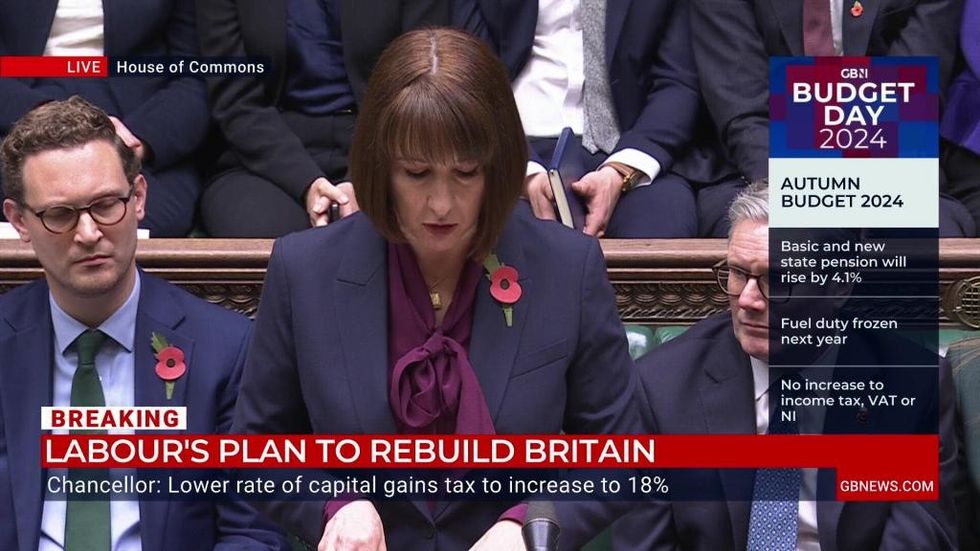Labour's inheritance tax raid to cause 'urgent crisis' as Britons dip into pensions early to avoid death levy
Rachel Reeves says she will bring inherited pensions into inheritance tax
Chancellor Rachel Reeves has announced a significant change to the UK pension system in her first Budget
Don't Miss
Most Read
Trending on GB News
Reeves's move is part of a broader package of tax changes aimed at raising £40billion for the Government revealed in the Autumn Budget this afternoon.
Currently, pensions sit outside the IHT net, allowing tax-free transfers of defined contribution (DC) pension funds if the holder dies before age 75.
Under the new rules, the value of pensions will be added to other assets when calculating IHT.
If the total exceeds £325,000, a 40 per cent tax will be levied on the excess.
The change could encourage pension savers to withdraw money earlier and potentially give it away to avoid future IHT liabilities.

Rachel Reeves says she will bring inherited pensions into inheritance tax from April 2027 in Budget2024
GBNEWS
Simon Merchant, CEO of Flagstone, the UK's largest savings platform warned: "There's an urgent crisis emerging here where many people are raiding their pensions early and don't have a plan for what to do with their cash."
Mike Ambery, retirement savings director at Standard Life echoed this sentiment and said: "In time we're likely to see more pensions, accessed earlier to prevent them from becoming part of people's IHT bill at a later date."
The Chancellor justified the change, citing the need to include pensions within IHT, particularly since the lifetime allowance on pension savings has been removed.
Ambery continued: "It's perhaps no surprise that the Government has decided to bring pensions into scope for inheritance tax as their exemption was little known to the public. At present it makes more sense to access Isas and other forms of saving before touching pensions, but this will change."
This alteration is expected to generate £1.46billion in revenue for the Government by 2029/30, according to Tom McPhail, Director of public affairs at the lang cat.
Hannah English of Hymans Robertson also believes the change may encourage savers to spend more of their pension pots now, reinforcing the Government's intent that pensions are for retirement income, not intergenerational wealth transfer.
She said: "With pensions assets now liable for inheritance tax from 2027 the implications for some DC members may be that savers start spending more of their pension pots now.
"This further reinforces this Government's clear intent that tax incentives for pensions are there to encourage individuals to receive a pension. The policy aim was never to encourage intergenerational wealth accumulation for the few.
"The announcement today will reinforce people to save into their pension and live independently while, and for as long as, they are alive."
Additionally, Madeleine Dowling from Wesleyan Financial Services explained that while pensions remain tax-efficient investments, clients may reconsider their retirement strategies. She suggests some might opt to reinvest in more IHT-friendly options, such as trusts.
She explained the change "has made IHT and retirement planning slightly more complicated as there will need to be a comparison between the IHT liability of leaving the funds in a pension compared to the tax incurred for withdrawing the funds."
McPhail predicts a shift in behaviour, with wealthier investors likely to draw more income from pensions rather than using them for IHT planning. He also anticipates increased interest in annuities over drawdown plans.
Reeves also introduced other IHT changes.
The nil-rate band freeze at £325,000 and the residence nil-rate band at £175,000 will be extended until 2029-30.
From April 2026, a £1million limit will apply jointly to agricultural property relief (APR) and business property relief (BPR) for IHT exemptions on qualifying assets.
Assets above this threshold will receive a reduced 50 per cent relief. BPR on AIM shares will also be reduced to 50 per cent and won't count towards the £1m cap on full relief.
IHT receipts are projected to increase, reaching £13.9billion by 2029-30.







